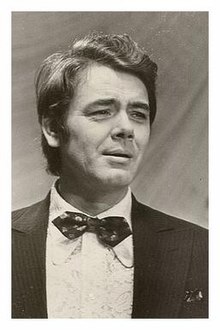Yuri Aleksandrovich Gulyayev[a] (9 September 1930 – 23 April 1986) was a Soviet opera singer from Tyumen, Ural Oblast, RSFSR.[1] The singer's voice was a lyric baritone.[2]
Yuri Gulyayev Юрий Гуляев | |
|---|---|
 | |
| Background information | |
| Born | 9 September 1930 Tyumen, Russian SFSR, Soviet Union |
| Died | 23 April 1986 (aged 55) Moscow, Russian SFSR, Soviet Union |
| Genres | Classical |
| Occupations | |
| Instrument(s) | Singing, accordion |
Career
editThis section needs additional citations for verification. (May 2024) |
He studied at the Ural State Conservatory in Sverdlovsk.[3] After graduating from the Conservatory, he sang at the Sverdlovsk Opera and Ballet Theater. In 1955, he became a soloist of the State Russian Opera and Ballet Theater in Stalino. Amongst his most notable performances were those at the Bolshoi Theatre in Moscow. The most successful roles are Germont ("La traviata" by G. Verdi), Onegin ("Eugene Onegin" by P. Tchaikovsky), Valentin ("Faust" by C. Gounod), Count Di Luna ("Il trovatore" by G. Verdi), Figaro ("The Barber of Seville" by G. Rossini).
However, the most popular were the singer's performances on the stage (over 200 works). In the late 1960s, the heroic and romantic theme of space exploration was developed in Soviet poetry and music. In 1968, the musical and vocal song cycle "Gagarin's Constellation" (written by Aleksandra Pakhmutova and Nikolai Dobronravov) appeared. The lyric baritone successfully harmonized with the singer's appearance – tall, powerful, with courageous, but soft facial features, with a special, charming smile, which was called "Gagarin's" with the light hand of Joseph Kobzon. According to A. Pakhmutova, "women loved Gulyaev to tears," he received bags of letters from fans.[4] Vocal works such as "The Russian Field", "On the Nameless Height", "My Kiev", "Song about Anxious Youth", were especially popular with listeners. the romance "Along the street the snowstorm sweeps", considered folk songs "From behind the island on the Strezhen" and "The Cliff of Stenka Razin", a number of Russian folk songs, in particular "Vdol po Piterskoy".
Gulyayev toured the Soviet Union and abroad a lot: he performed in Austria, Belgium, Bulgaria, Hungary, GDR, Canada, Cuba, Poland, United States, France, Czechoslovakia, Switzerland, Yugoslavia, Japan and other countries. In 1964 he performed at the Olympia in Paris.
During his lifetime, more than 25 records with the singer's recordings were published. Yuri Gulyayev also starred in several movies.
The singer's last recording took place on 12 April 1986, on Cosmonautics Day – it was a teleconference with cosmonauts V. Solovyov and L. Kizim, who were in orbit. The singer performed a song "My beloved waved a handkerchief at the gate" to his own accompaniment on the accordion.
He was named a People's Artist of the USSR in 1968. Gulyayev died on 23 April 1986[5] of heart failure at the age of 55.
Personal life
editGulyayev loved to drive a car. In his spare time, his favorite activities were chess and playing the piano. From literature, he was very fond of the works of Anton Chekhov and Sergei Yesenin.[4]
Wife (since 1960) – Larisa Mikhailovna Gulyaeva – journalist, editor, teacher. Son – Yuri Yuryevich Gulyaev (born 12.12.1964), Candidate of Philosophical Sciences, lecturer at the Faculty of Pedagogical Education of Moscow State University.
He had friendly relations with Muslim Magomayev and Boris Shtokolov.[4]
Awards
edit- World Festival of Youth and Students (1959)
- Merited Artist of Ukrainian SSR (1960)
- People's Artist of Ukrainian SSR (1965)
- People's Artist of the USSR (1968)
- Order of the Red Banner of Labour (1971)
- USSR State Prize (1975)
- Order of Friendship of Peoples (1976)[6]
- Honorary Citizen of Tyumen (2005)
Selected songs
editNotes
editReferences
edit- ^ Biography at vor.ru Archived 4 February 2005 at the Wayback Machine
- ^ "Vokalizm.ru. Лирический баритон". Archived from the original on 6 October 2015. Retrieved 13 September 2015.. In Russian
- ^ Струганов В. (2019). ""Что было – кануло, что было – не было..."". Проза.ру.
- ^ a b c "Вдова Юрия Гуляева Лариса: Знаете, каким он парнем был". Archived from the original on 20 July 2014. Retrieved 15 July 2014.. In Russian
- ^ "Юрий Гуляев". Archived from the original on 16 September 2015. Retrieved 19 August 2015.. In Russian
- ^ "Указ Президиума Верховного Совета СССР от 25 мая 1976 года «О награждении орденами и медалями СССР работников Государственного академического Большого театра СССР»" (PDF). Archived from the original (PDF) on 19 August 2019. Retrieved 6 April 2022.. In Russian